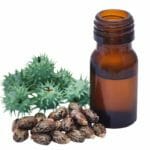Forget Protein Powder, Collagen Might Be Your New Secret Weapon
At BeautyCaters, our expert team independently curates every recommended product. Purchases through our links may earn us a commission. Explore our transparent selection process.
Our skin can only remain wrinkle-free for longer if it has a strong collagen structure. This protein is therefore crucial for our youthful appearance. Unfortunately, simply applying collagen to the skin doesn’t work. For a long-term effect, the body’s own collagen formation must be stimulated.
Does collagen count as protein? To know that, we should know what is collagen and how it helps us. Let us find out more about collagen.
Table of Contents
What is collagen?
Collagen is the most abundant protein in the human body. 30% of our proteins are collagen. It is a structural protein that gives many parts of the body their strength. Different forms of collagen are found not only in the skin, but also in our bones, cartilage, and teeth. Collagen also provides the tensile strength of our connective tissue.
Collagen plays an essential role in the formation of the skin. Along with ceramides (formation of the skin barrier), Natural Moisturizing Factor (the natural regulation of moisture content) and hyaluronic acid (an endogenous moisturizer), collagen is the “base” of the skin.
Collagen is rich in the two amino acids glycine and proline and is approximately 1,000 individual amino acids long. A highly stable construct that performs structural functions. Hence “structural protein”.
Collagen forms a kind of framework in the body in which the collagen fibers can be imagined as a thick rope. Many fibers twist around each other, bundle up. Constant, opposite rotations increase resilience. There are parallel collagen structures such as in tendons and ligaments and collagen lattice networks such as in bones.
Collagen fibers are like the super glue that holds our body together.

Where does the name collagen come from?
There is kolla in the word collagen, ancient Greek for glue or glue-producing. Collagen is our body’s natural ‘glue’. This is reflected in the binding function of gelatin, which consists of collagen peptides. Interestingly, the ancient Greek word is found in contemporary Italian. Colla di pesce (fish glue) is what gelatine is called in Italy today.
Bones, cartilage, connective tissue: there is no part of your body that can do without collagen. Depending on its chemical structure, collagen can take on very different properties. It makes cartilage pressure-resistant, tendons resilient, and skin resistant. Type I collagen is the most common in your body.
Types of Collagen
In addition to the amino acids glycine and proline, collagen consists of hydroxyproline and hydroxylysine. The latter two primarily ensure the stability of collagen. In order to be formed by collagen synthesis, both absolutely need vitamin C.
There are around 28 types of collagen, of which types 1, 2 and 3 are the most common in the body. However, here is a rough overview of where each type of collagen is most commonly found:
- Collagen type I: skin, tendons, bones, dentin (tooth bone), fascia, vessels, internal organs
- Collagen type II: cartilage, vitreous body of the eye
- Type III collagen: skin, uterus, blood vessels
- Type IV collagen: in kidney glomeruli (filter bodies), eye lens, cell membrane of skin and vascular cells
- Collagen type V: cell membrane of muscle cells

Build-up of collagen
The 28 different types of collagen share a common trait. They contain a so-called triple helix: 3 long strands of amino acids are wound around each other in a spiral. These strands, called alpha chains, consist of up to over 3000 amino acids. The alpha chains are also called polypeptides – the components of collagen.
Fibroblasts, specialized cells in connective tissue, make collagen. They ensure the structure of the extracellular matrix. This is the space between the individual cells. Here the collagen fibers latch in like the rungs of a scaffold and stabilize the tissue.
In type I collagen, this triple helix accounts for 96 percent, in collagen XII only 10 percent. These triple-twisted chains are made up mostly of the amino acids glycine, proline, and hydroxyproline. The triple helix is also called the tropocollagen unit.
There are hydrogen cross-links between the individual amino acids. They additionally stabilize the triple helix. This is why collagen in cartilage can withstand enormous pressure. The amino acid glycine is also important for the stability of collagen. It is so small that it perfectly fills in the gaps between larger amino acids in tropocollagen units. This allows the alpha chains to be tightly twisted.
Multiple tropocollagen units combine to form collagen fibrils. These are thin fibers of collagen. Together, collagen fibrils then form stable collagen fibers, which develop their supporting function in the extracellular matrix. In principle, you can think of collagen fibers as steel cables. In the extracellular matrix, it forms a scaffolding around cells that protects them.

History of Collagen
These structural proteins are probably among the oldest substances on our planet. Sponges have been making collagen for billions of years to survive in our planet’s oceans.
These multicellular creatures are among the oldest creatures on earth and are officially classified as animals. The oldest specimen was found in 1.8 billion-year-old sedimentary rocks.
Scientists have also found collagen in the connective tissue of fossilized bones. Intact type I collagen was found in a 68-million-year-old Tyrannosaurus rex.
The binding properties of collagen were probably already appreciated by the ancient Egyptians, because they used it to glue pieces of furniture. Greeks gave the name to collagen. The Roman Pliny the Elder describes the production in his natural history.
Interestingly, the structure-forming properties of collagen for wound healing were already beginning to be used at this time.
However, the sticky and gelling qualities of these proteins clearly came to the fore in the centuries that followed. In the Middle Ages, gelatine was obtained for culinary dishes by boiling pig ears and feet. The first celebrity chef, Frenchman Marie-Antoine Carême, was a fan of all kinds of aspic. We owe the mass production of gelatine in the form of dried strips to the industrial revolution.
The first creams with bovine collagen came onto the market as early as the 1950s. At that time, knowledge about the effects of collagen was primarily based on experience. But science quickly caught up.
In 1969, US researchers Edward Miller and Victor Matukas discovered type II collagen in chicken cartilage. This was the start of scientific research into collagen. Researchers recognized that collagen is essential for joints, bones, and teeth.
In 2001 came a landmark study that looked at the precise structure and composition of collagen in the retina of the eye. Since the turn of the millennium, the importance of collagen in nutrition has also been intensively studied. Around the same time, the cosmetics industry discovered the anti-aging effects of collagen.

Cosmetics with collagen? How does it work?
Today there is an almost incalculable variety of products with collagen. In addition to drinking ampoules, powders and capsules, many cosmetic products advertise the ingredient collagen. Face masks, serum, eye pads, hydrogel, hand cream: collagen is considered the miracle cure for anti-aging in cosmetic products.
However, it remains questionable whether the external application of collagen can achieve much. The skin is your body’s protective covering and has a natural barrier function. That means it lets as little as possible through.
In an animal study, Chinese scientists found that around 8 percent of applied collagen can penetrate the skin. Korean scientists concluded that type I collagen is completely trapped in the epidermis. That means it can’t penetrate into the extracellular matrix where it’s actually needed for wrinkle relief.
Nevertheless, you can use collagen for anti-aging. This is even recommended because the body begins to produce less collagen in the second decade of life. The reason for this are the so-called growth factors, signaling substances that become increasingly sluggish with age. In addition, the body’s own collagen in seniors is no longer as good as it was when they were young. The fibers are often brittle and fragmented and therefore no longer support the tissue as well.
Ideally, you should include plenty of high-quality collagen in your diet – as bone broth, as collagen powder or through dishes with a lot of gelatine and aspic. Already 2.5 to 10 grams per day can have a significant effect. The collagen density in the skin and hair improves. The skin becomes more elastic and can retain moisture longer. Studies show that for these effects you need to take collagen for at least four weeks, preferably longer.
Effects of Collagen in the body
Collagen gives strength to many parts of the body. It is one of the most important building blocks of skin, bones, muscles, tendons and ligaments – but is also a component of blood vessels, cornea and teeth.
Not all of the functions of collagen have been fully elucidated. It is clear that collagen is mainly responsible for the strength, elasticity and moisture of the skin, joints, tendons, ligaments and cartilage.
If there is enough collagen in the skin, for example, it looks youthful, healthy and wrinkle-free. Collagen degradation is one of the reasons for skin aging.

1. Collagen for skin, hair and nails
It is the course of nature: the collagen in the body decreases with age. By around 1% every year from the mid-20s. During perimenopause, the first few years of menopause, female skin loses about 30% of its collagen on average. Fair skin is on the higher end of this spectrum, while black and brown skin, which naturally contains more dermal collagen, is on the lower end.
If the skin lacks structure, it begins to sag. Combined with the drop in estrogen as menopause progresses, skin becomes thinner, paperier, more wrinkled and even saggier. By the age of 80, there is only about a quarter of the collagen left in the skin.
2. Collagen For Joints
In addition to age-related collagen degradation, the joints of active people are particularly exposed to heavy loads. Whether jogging, CrossFit, weightlifting, yoga, or cycling. All of these sports activities are healthy and beneficial, but they can put a strain on the joints.
In addition to improving skin texture, collagen can also help relieve joint and osteoarthritis pain. Many athletes rely on collagen for regeneration.
Eggshell membrane collagen, which naturally contains glycosaminoglycans, chondroitin sulfate, and hyaluronic acid in addition to collagen, was superior to other drugs in a study to treat arthritis. When it comes to osteoarthritis, a special form of joint inflammation, research needs to show even more clearly how well collagen works here.
Collagen can be beneficial for the following problems:
- joint pain,
- Arthrosis,
- Arthritis,
- Rheumatism,
- osteoporosis,
- a broken bone
- a torn ligament,
- a cartilage damage or
- disc prolapse
3. Collagen for connective tissue and blood vessels
As an endogenous active ingredient, collagen is contained in our connective tissue
- of weight fluctuations,
- significant weight gain or weight loss,
- puberty or
- pregnancy
can lose elasticity. This can show up as cellulite, spider veins or varicose veins. The reduced estrogen release caused by menopause can also lead to the subcutaneous connective tissue producing less collagen.
There is still no tried and tested remedy for cellulite, but it is assumed that a daily intake of 2.5 g of collagen can lead to an improvement in the complexion and a tightening of the tissue – ideally in combination with massages to stimulate blood circulation healthy diet, exercise and weight loss.
Collagen is also said to be able to have an effect on the blood vessels by strengthening the vessel walls and keeping them elastic. This, in turn, can help prevent cardiovascular disease.

4. Collagen for the gut
Many people today suffer from indigestion, which can be accompanied by flatulence, diarrhea, constipation or abdominal pain. Often they are caused by certain food components, for example by
- fructose,
- gluten or
- Lactose.
Inflammatory bowel diseases (Crohn’s disease, ulcerative colitis) and altered intestinal flora can also lead to an imbalance in the intestine. As soon as intestinal problems become chronic, damage to the intestinal mucosa and small intestine cells can occur.
Collagen – preferably in combination with hyaluronic acid – is said to be able to contribute to better protection and repair of the intestinal mucosa and small intestine cells. Glycine, the main component of collagen, is said to have a particularly beneficial effect.
5. Collagen for a healthy sleep
Here’s another tip for athletes: Experts suspect that the active ingredient may also improve sleep. If you also suffer from problems falling asleep or staying asleep, supplementing with collagen could help you fall asleep and sleep through the night better and contribute to better sleep quality. The active ingredient is said to have a positive effect on the deep sleep phases in particular.
Other Effects Of Collagen
In addition to the positive effect on the elasticity and moisture of the skin, connective tissue and joints, collagen also shows positive effects in improving insulin sensitivity, blood sugar levels and lowering blood pressure in type 2 diabetics.
The effect of collagen on intestinal health, especially on a disturbed intestinal mucosa, as with a leaky gut, has not yet been confirmed by study results.

What degrades collagen, besides age:
- Too much sugar and fast carbohydrates: impair collagen’s ability to repair itself. Called glycation, the tissue fibers of the skin caramelize (stick together).
- Too much sunshine: UV rays can reduce collagen production
- Smoking: reduces collagen production, impairs wound healing and promotes wrinkles.
Elastin, Keratin & Hyaluronic Acid Also Decrease
In addition to collagen (firmness), the content of elastin (elasticity), hyaluronic acid (regulates moisture content), certain vitamins and keratin (protection and stability) in the skin decreases with age.
All of this weakens the outer protective barrier of the skin. Irritants such as inclement weather, bacteria, pollution and injury can therefore more easily penetrate the barrier and damage the lower layers of the skin.
Also, as we age, DNA repair mechanisms are less efficient, making it easier to develop fine lines, hyperpigmentation, sun spots, and uneven skin tone. This shows how important antioxidants become in diet and skin care as we age and why sunscreen is becoming a daily must-have!
What promotes the formation of collagen?
In addition to amino acids, your body needs vitamin C to build collagen. This vitamin activates the metabolic enzymes responsible for the production of collagen. If vitamin C is insufficient, your body cannot stably anchor the amino acid hydroxyproline in the triple helix. In this case, tropocollagen units are unstable and break down quickly.
Tip: When you consume food, collagen powder or bone broth, you should take vitamin C at the same time. This gives a real boost to collagen formation.
What are Gelatin, collagen hydrolysate, hyaluronic acid, elastin?
We often read terms that are similar or that appear together. Here you can find out what is hidden behind individual terms.
Gelatin
Heat destroys the structure of tropocollagen units, as do acids, but bases also have this effect. For this reason, recipes for bone broth always contain acidic ingredients such as apple cider vinegar or tomatoes. When substances containing collagen, such as bones, cartilage or tendons, are cooked, the connections between the triple helix are loosened. What remains are individual alpha chains, the collagen peptides.
When they cool, they gel. Exactly how gelatin behaves depends on the source of the collagen. Temperature, boiling time and pH of the liquid also play a role.
Collagen hydrolysate
This substance is formed when the extracted gelatin is further broken down by enzymes. What remains is a whitish powder that we know as protein powder. It can be easily dissolved in liquid. Collagen hydrolysate is often used in dietary supplements. It helps to keep joints or skin healthy.
Hyaluronic acid
The extracellular matrix surrounds the cells in connective tissue. Here, the proteins collagen and elastin are embedded in a gel composed of proteoglycans and polysaccharides. One of these polysaccharides is hyaluronic acid, a long chain of sugar molecules.
In the skin, hyaluronic acid combines with water. It has the ability to plump up the skin from within, reducing wrinkles. In joints, hyaluronic acid contributes to synovia (synovial fluid). Hyaluronic acid is also important for supplying fluid to the eyes.
Elastin
With this protein, the name says it all, as it does with collagen. Elastin keeps the extracellular matrix supple and elastic. Even after stretching, this protein can rapidly contract again. Elastin is found not only in the skin, but also in blood vessels, the lungs and tendons.
Where is collagen found?
Natural Foods With Collagen
The amino acids that make up collagen are found only in animal foods that contain muscle or connective tissue. These include meat, chicken, fish and egg.
Natural sources of collagen – primarily for type 1 collagen – are cattle, pigs and fish. Marine collagen is very similar to that of beef and pork in terms of bioavailability. It may have fewer toxins and fewer inflammatory effects than meat collagens. More on the various sources of collagen in supplements follows below.
In addition, there are foods that stimulate collagen production because they contain the vitamins and minerals needed to build collagen, such as vitamin C, copper, zinc and biotin.
Are collagen supplements vegan?
Collagen is an animal protein. So the answer to this question is a resounding no. Vegetarians and vegans should therefore ensure that they consume a variety of plant-based amino acids. The metabolism can form sufficient collagen from this.
Products that advertise being vegan usually only contain plant parts that support collagen synthesis in the body. However, natural vitamin C from peppers, kiwi, citrus fruits or berries already does that. Some “vegan” collagen products also contain amino acids, which make up the structure, or building blocks, of collagen. However, the likelihood that this will result in a collagen molecule is low.
The following foods contain important amino acids for collagen:
- sesame, poppy and hemp seeds
- sunflower seeds
- peanuts
- yeast flakes
These foods help form collagen:
- Sea Buckthorn and Sea Buckthorn Juice
- Rose hips and rose hip powder
- baobab powder
- nettle and stinging nettle seeds
- citrus fruits
- Red and yellow peppers
Medicinal mushrooms such as almond mushrooms, shiitake, porcupine, or Judas ear can also boost collagen production.
Is gelatin also collagen?
Bone broth or “bone broth” is cooked collagen that is in the form of gelatin. Gelatin is effectively cold collagen. Gelatin, unlike hydrolyzed collagen from supplements, is not as well absorbed by the body. In addition, it is not known exactly how much collagen is actually in home-cooked or store-bought bone broth, as this is not tested or reported.
Collagen instead of protein powder?
Does collagen replace other protein powders? No, because collagen is an un-complete protein. Therefore, it should not and cannot replace other protein sources! In particular, collagen is not a substitute for protein powder for muscle building and muscle maintenance:
- Collagen contains too little of the muscle-building BCAAs (valine, leucine and isoleucine)!
- Collagen does not contain the amino acid tryptophan.

Collagen as a dietary supplement
We are often asked whether collagen production can be boosted with appropriate dietary supplements. Yes, because the human organism tries to regenerate around the clock. When we give our body what it needs to work, it ages less quickly. This is our philosophy of natural anti-aging.
However, we often disturb our body: we smoke, sleep too little or drink alcohol. We can counteract this with a healthy diet. The first thing to do is a balanced diet and healthy habits and be cautious with stimulants!
You can also support the organism with antioxidants such as vitamin C or by taking amino acids. Amino acids are the small building blocks of proteins. The collagen polypeptide chains are also formed from them. These in turn form procollagen and finally collagen.
Supplements from beef, pork or fish usually contain hydrolyzed collagen. This means that it is bound in water and is absorbed faster and better by the body. Collagens in supplements are of different origins:
1. Collagen from beef or pork
Bovine collagen is one of the most widely used sources of collagen. It is industrially produced primarily from cow skin, bone and tendon through chemical processes. Some people have allergic reactions to it. Diseases such as BSE, TSE and mad cow disease, can also have negative effects here.
Porcine collagen is chemically derived from the skin and bones of pigs. Since it is quite similar to human collagen, it hardly causes allergic reactions.
2. Collagen from fish
Marine collagen is currently one of the more popular sources of collagen because it causes fewer inflammatory and immunogenic reactions than collagen from cattle. Fish collagen is extracted from the skin, bones and scales of fish, using chemical processes to remove the non-collagenous proteins and pigments.
If you choose collagen powder from beef, pork, or fish, make sure that it is hydrolyzed type I collagen.
3. Collagen from eggshell membrane
Rarer, but equally effective and bioavailable, is vegetarian collagen from the membrane of chicken eggshells. Eggshell membrane collagen is the only natural source of collagen that is not derived from dead animals.
It has a unique natural composition: Multi collagen of type I, type V and type X collagen. Plus significant natural amounts of chondroitin sulfate, glucosamine, hyaluronic acid, elastin, lysozyme, keratin and others.
Eggshell membrane collagen is ideal because the risk of autoimmune and allergic reactions is low. In addition, collagen from eggshell membranes is biologically safe.
Eggshell membrane collagen is equally well utilized and absorbed by the body in both hydrolyzed and normal natural forms. It requires significantly lower collagen dosages for effective use due to the high purity of bioactive substances in eggshell membranes.
4. Collagen from chicken cartilage
Mainly type 2 collagen is obtained from chicken cartilage.
5. Synthetic collagen
Very new and still being researched are synthetic collagens artificially produced from fermentation of yeast and bacteria. Exciting prospects if these collagen peptides prove their efficacy in studies. So far, the efficacy of microbial collagen has not been confirmed in sound (peer-reviewed) studies. But even this microbial collagen would not be vegan, strictly speaking.
Do collagen capsules or drinking ampoules help?
What about taking collagen products? Collagen capsules, drinking ampoules or collagen peptides are available in large numbers nowadays. These do not really seem promising, at least not so far.
Collagens are proteins. If you take them in pill form, they are quickly broken down into their components in the stomach or, at the latest, in the small intestine. These are essentially amino acids such as glycine, lysine and proline. However, these amino acids are nothing out of the ordinary. They are normally not missing in a balanced diet, because they are present in almost all proteins.
So, unfortunately, it is not the case that collagens go from the stomach to the skin and make us look 20 years younger! Studies also show that the more effective option is skin care. Topical application (topical means at the site of action) provides the skin with the respective substances much better than oral ingestion.
For example, valuable vitamin C skin care achieves about 20 times higher vitamin C skin concentrations than swallowing vitamin C tablets (see sources for the corresponding study).
Things to know about collagen supplements
Do collagen powders work?
The impact of collagen supplements, especially on skin health and joints, has been studied in numerous trials. A recent meta-analysis from 2021 alone included 19 randomized controlled trials (RTCs), many of them not funded by industry. The research finding: compared to placebo, 90-day use of collagen effectively reduced skin aging, reduced wrinkles, and improved skin elasticity and hydration.
For an effect on connective tissue during sports, it is recommended to take collagen about 1 hour before sports. However, more research is needed here for reliable conclusions.
Can the body absorb collagen?
Yes, it can. Collagen is absorbed into the bloodstream as small peptides and free amino acids in the small intestine. From there, it is primarily transported to the skin.
There are differences in terms of absorption between the types of collagen (types I, II and III), the forms of collagen (collagen hydrolysate, collagen peptides, gelatin and “raw”, non-denatured collagen) and the preparation and purity of the starting raw materials.
As mentioned, it is important to have enough vitamin C in the body. However, studies have shown that the amount of vitamin C does not need to be very high. The normal daily amount of a vitamin-rich diet is already sufficient for successful collagen synthesis.
In addition, vital substances such as biotin, zinc, copper and manganese support the absorption of collagen. All also components of a healthy plant-focused diet.
How long does it take for collagen to work?
As is often the case, the length of time before an effect is visible is highly individual. In many studies, participants report visible and noticeable effects after 1 to 4 weeks of regular daily use.
How much collagen do I need per day?
Collagen is stored in the skin for about 2 weeks. Regular supplementation is therefore advisable. The effective amount of collagen depends on the collagen used:
- In studies, hydrolyzed collagen (mostly type 1 from beef, pork or fish) is used in dosages between 2.5 g to 10 g daily.
- Non-denatured type 2 collagen (from chicken cartilage) is about 40 mg in dose.
- Eggshell membrane collagen (type 1, vegetarian, from chicken eggshells) ranges in dosage from 300 mg to 500 mg in studies, depending on the purity of the starting raw material and the manufacturer’s extraction process.
What is better? Collagen powder, drinking ampoules, capsules, powder?
The preparation does not matter, as mentioned before, the collagen type and the collagen source are more important.
Do collagen creams work?
In most cases, the collagen peptides are too large to penetrate the skin. Our skin is constructed in such a way that pollutants and bacteria cannot penetrate the body and the water does not evaporate from the body. This means the skin is a very effective barrier, preventing large molecules like collagen from entering the bloodstream through the skin’s layers. But this is exactly where the collagen building blocks have to get to in order to promote collagen production in the body.
Can collagen be rebuilt?
The mix of good nutritional supplements and a healthy lifestyle – which stimulates and promotes collagen formation – can help to maintain and rebuild collagen stores in the body.
Does hyaluron need collagen?
Good collagen preparations with high bioavailability show effective effects in studies, solely due to the collagen, without additives. Additional hyaluron can also stimulate the production of hyaluronic acid in the skin. Here, too, the quality of the hyaluronic acid is decisive: a molecular weight of 800-1500k Dalton is well absorbed. Hyaluron is also obtained from animal materials, mostly from cockscombs. There is now vegan hyaluronic acid, produced via fermentation, which is more expensive.
Does collagen have side effects?
Collagen is very well-researched and well-tolerated, even over a long period of time ( Review Study 2019 ). The quality of the respective collagen food supplement and the purity of the collagen raw material used are decisive. This should be free of heavy metals and toxins.
Allergy sufferers: Avoid ingredients such as shellfish or fish to which you could be sensitive. So check the ingredients list to see where the collagen comes from (beef, fish, chicken, egg).
How collagen can cause side effects?
Collagen is a natural protein that usually does not cause any side effects. Nevertheless, it is a dietary supplement that can cause side effects if taken improperly. In contrast to dietary supplements, side effects are more likely to occur when using cosmetics, for example when applied to the skin or hair.
It is more natural to supply collagen through nutrition so that the body can utilize it optimally. Along with chicken, beef, or pork, freshly made bone broth is one of the best ways to provide your body with natural collagen. If you prefer to take the active ingredient as a dietary supplement, you should always stick to the consumption quantity specified by the manufacturer and not exceed the maximum dosage.
Summarized
The effect of collagen on the skin and joints has been extensively examined and proven in many studies, including independent studies. Dietary supplements with effective collagen peptides are a good way to counteract natural age-related collagen degradation.
However, collagen alone is of course not a miracle cure for forever-young skin and supple joints. At the same time, this should be on the agenda:
- Enough protein every day – particularly relevant for all women over 40, since protein synthesis does not work as well after menopause. Roughly remember: A quarter of every meal should consist of – ideally plant-based – protein sources.
- Vitamin C to stimulate collagen synthesis. So get your fruit and veg! Adult women at least 75 mg per day – but higher amounts of the water-soluble vitamin C are also harmless.
- Strengthen collagen naturally: exercise, sleep, drink plenty of water, avoid UV light or use sunscreen and do not smoke.
Conclusion: Does collagen count as protein?
In conclusion, collagen is an essential structural protein in the human body. It accounts for 30% of our proteins and provides strength and tensile strength to different parts of the body, including skin, bones, cartilage, and teeth.
It is composed of two amino acids: glycine and proline, and is approximately 1,000 individual amino acids long. Along with other components such as ceramides, Natural Moisturizing Factor, and hyaluronic acid, collagen forms a strong framework in the body, providing structure and stability.










